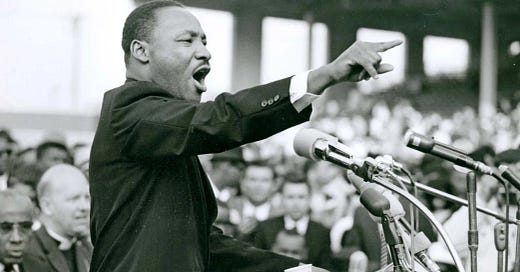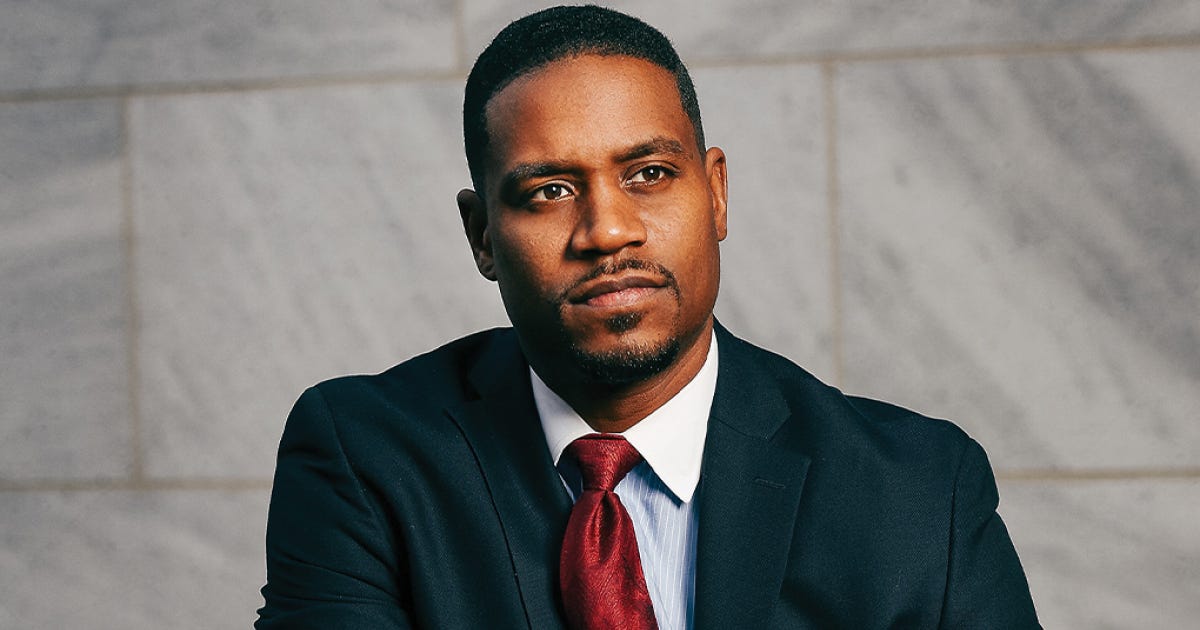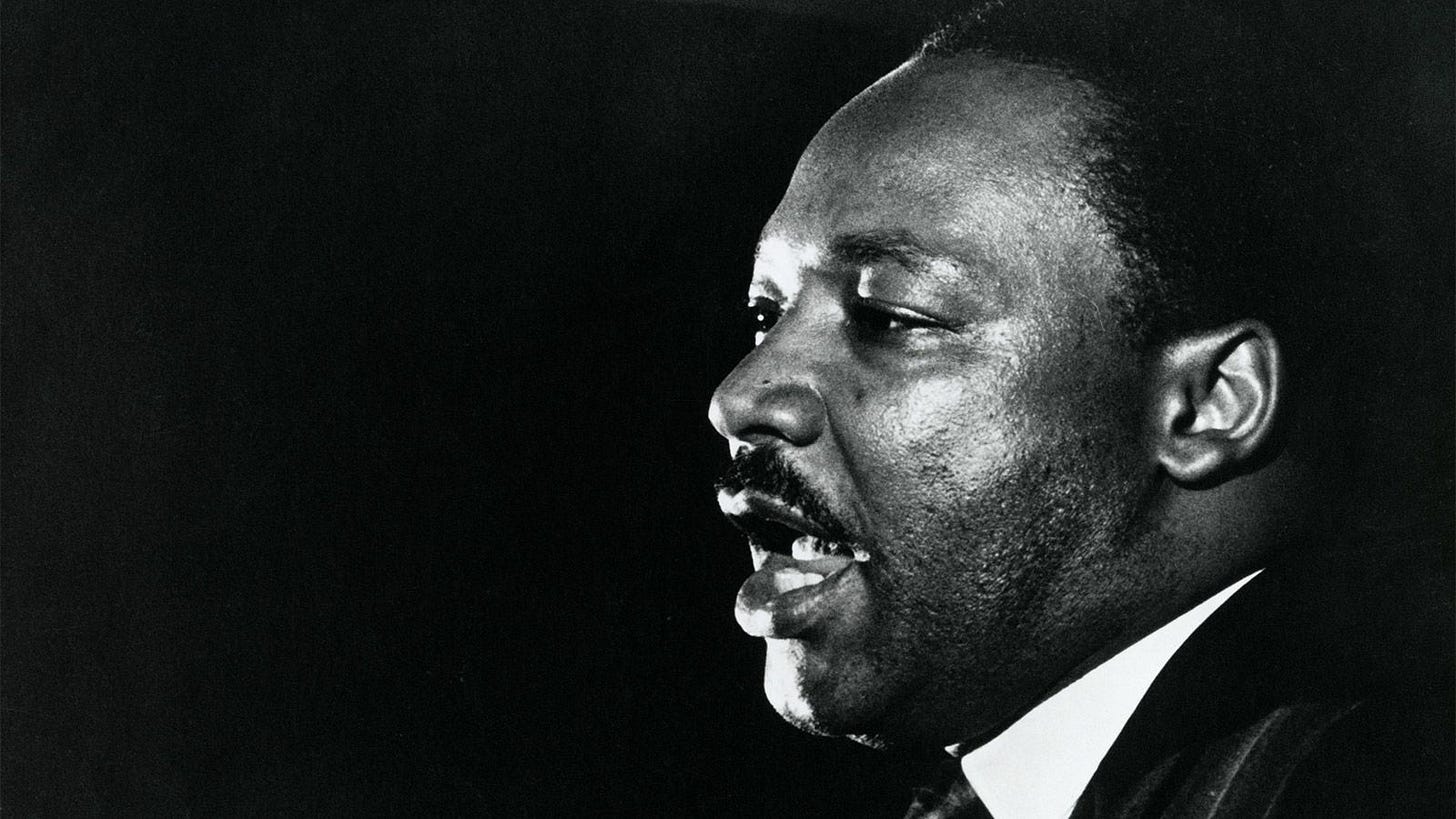The Legacy Theft of Martin Luther King Jr.
Responding to John MacArthur's racism & Justin Giboney's "Christianity Today" article
Recently, continuing in a lifelong project of theological ineptitude, noted white evangelical pastor and theologian John MacArthur disparaged and insulted the late Rev. Dr. Martin Luther King Jr., referring to him as an “immoral” individual, a “non-believer”, who “misrepresented everything about Christ and the Gospel” and was “not a Christian at all”.
It is reasonable to assume two things based on these remarks; that Mr. MacArthur deliberately made these statements for the sake of notoriety and inhabiting a role as provocateur, and that Mr. MacArthur has no idea what he’s talking about.
At risk of stating the obvious, none of what Mr. MacArthur asserted about King is even remotely accurate; Dr. King was a revolutionary and brilliant Christian theologian whose work encompassed and incorporated many different theological traditions, from liberal Protestantism to neo-orthodoxy to personalism to the prophetic wing of Black Christianity. He led a movement that fundamentally altered the course of American religious history, and world history altogether. The Civil Rights Movement was not a one-man show, but it is an undeniable fact that King’s leadership showed the world that the consciousness of American Christianity was in the African American Church.
As far as the allegations against King’s personal life, made known to the public only because of a decades-long harassment and psychological torture campaign against King carried out by the FBI and its notorious founder, J. Edgar Hoover, Mr. MacArthur is in no moral position to offer commentary. Until he holds his own white historical standard bearers of Jonathan Edwards and George Whitefield to the same standards of ethical behavior as he holds King, he is at best, a hopeless fanatic grasping at red herring straws, and at worst, a slanderer doing the work of the anti-Christ.
Equally troubling as MacArthur’s virulent tirade, which seems to be part of a concerted effort by white Christian nationalists seeking to undermine King’s legacy as his radicalism becomes harder to avoid, was the mealy-mouthed and gravely hypocritical response to it written in Christianity Today by Justin Giboney, a Black political strategist and attorney who founded “The And Campaign”, a Christian organization that seeks to bridge the political divide between American Christians through a “revival of civic engagement”, which in effect, promotes a theo-politic of centrism.
Giboney’s article Why John MacArthur is Wrong About MLK provides its own counter to MacArthur’s claim that King “wasn’t a Christian” by arguing with equal fervor that King returned the “conservative faith of his Baptist upbringing” as he grew into a leader of the Civil Rights Movement.
Also penciled into this article are right-wing-coded critiques of the “far left” who, in Giboney’s words, "distort social justice” and care “more about individual autonomy and self-indulgence than equality under the law and social order”. Giboney also says that he “laments when Christian leaders imi
tate secular activists and academics in the public square and fawn for their validation.”
Who exactly Giboney is talking about remains a mystery to the reader, as he never specifies. Likewise, his ideological critique of the Left, while certainly not easy to dismiss out of hand, contains no concrete examples of what exactly he’s talking about.
Given he and his organization’s long history of parroting homophobia, anti-trans bigotry, and anti-choice politics, it can safely be assumed that Giboney’s definition of “individual autonomy” and “self-indulgence” are just bigoted dog whistles.
Moreover, Giboney’s pretentious attachment of King’s legacy to his own theological centrist, “both-sides” ism is just as shameless and void of history as MacArthur’s racist revisionism. While he certainly has a right to claim a personal and theological connection to King’s prophetic legacy in some ways, Giboney and his cadre of center-right Black preachers can more confidently claim that they continue in an overall legacy of Black Church history and political radicalism that failed Black women and Queer and Trans people by refusing to incorporate them into their narrow, heterosexist views of “Blackness” and “Christianity
This is not to say that critiquing the Left is somehow “out of bounds”; any political project made by human beings should fall under the close scrutiny of theological criticism, if for no other reason than it does not come from God, and there are many valid criticisms of left-wing politics to be made.
However, any Black theo-politics that centers heterosexual and cisgender Black men and seeks to obscure the very real and present threat of Christo-fascism on the far-right by lazily declaring that “both sides are bad” is a Black theo-politics that capitulates to the violent forces of anti-Queer, anti-Trans and colonialist ideologies that seek to destroy Black life. It is a theo-politics of White centrism in Blackface.
Furthermore, Dr. King was not a “conservative” theologian, and his theology as a whole does not fit into the paradigm of “liberal” or “conservative”, however much white evangelicals and liberals may want it to.
King was a representation of the dynamic and peculiar nature of Afro-American Christianity, which arises out of the context of white racism, subjugation, degradation, and oppression, and seeks freedom and fullness; appropriating the doctrines of Christ’s salvific power and wondrous works, and the revolutionary theological insights of Christ’s Blackness and His full participation in the Black freedom struggle.
This peculiar mixing of historic doctrine and liberation may seem confounding or even contradictory. This is especially the case among those who’ve gotten accustomed to the “mainstream” debates between white traditionalist theology, which emphasizes the spiritual and metaphysical elements of Christianity while ignoring or even attacking the material elements in the name of “evangelism” and “saving the lost”, and white liberal theology, which emphasizes the material elements of Christianity while deriding the metaphysical as “primitive” or “mythological”, in the name of a “Christianity of reason”.
Black Christianity, however, is not under the jurisdiction of white definitions and the oppressive discursive tools of white theology; it exists on its own merit as a response to God’s revelation to the enslaved people brought to these American shores from their homelands on the continent of Africa.
King understood this audaciousness, and it was in pursuit of it that he gave his life. No man is perfect, and the King tradition stands in historical judgment of those who were left out of it; mainly Black Queer and Trans people, and Black women.
However, rather than trying to form King, now fifty-six years in the grave, into our own image, perhaps our time would be better served by recognizing and celebrating King as he was and is a crucified Black prophet.
Through this acknowledgment, we should allow God to form us in His image, equipping us to throw off the shackles of whiteness and heterosexism and live into the fullness of God’s perfect freedom.








Thank you so much for sharing this. In Latin America we do not have on specific figure like Dr. King. We have many throughout the continent. And the efforts of white centered theology to discredit each one of them has been part of our struggle for many decades. What is more, MacArthur and many others like hime have become the social and theological paradigms for many. The violent and exclusionary theologies they spread make it to the pulpits of the smallest churches in rural communities. Also, your statement "Black Christianity, however, is not under the jurisdiction of white definitions and the oppressive discursive tools of white theology; it exists on its own merit as a response to God’s revelation to the enslaved people brought to these American shores from their homelands on the continent of Africa." Is pure gold. That is exactly what we have tried to show North-Atlantic institutions about Latin American theologies for decades. Thank you for this note.
This should be more widely read. Thank you, Talique.